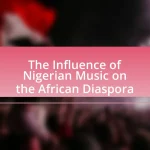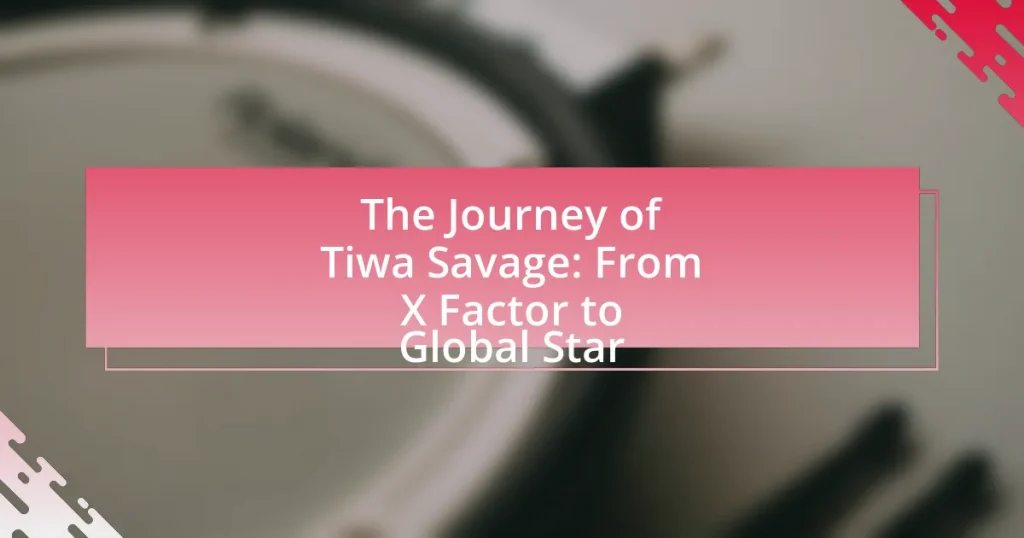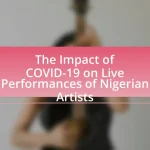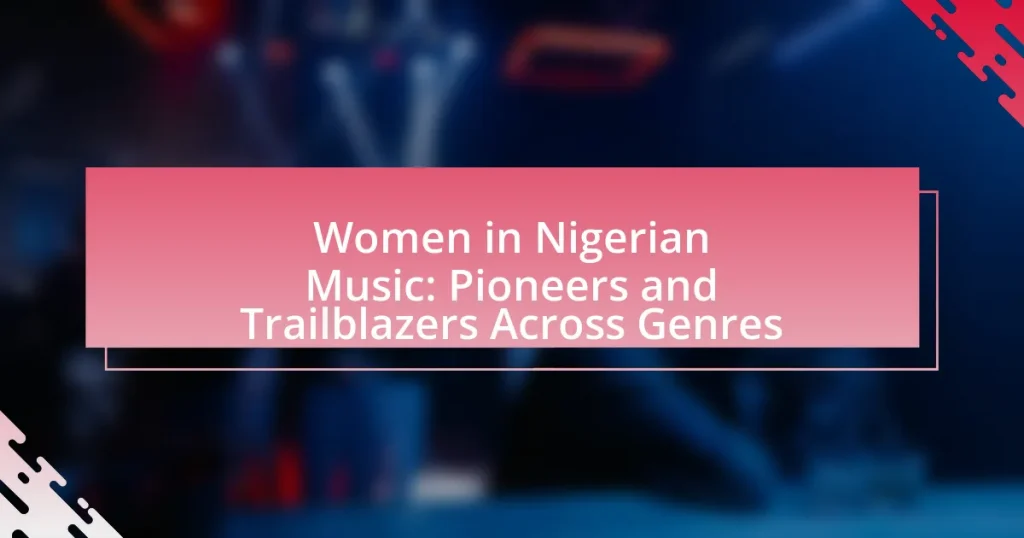Tiwa Savage, born on February 5, 1980, in Nigeria, has emerged as a prominent figure in the Afrobeats genre, gaining initial recognition through her participation in the UK version of X Factor in 2006. Her career trajectory includes significant milestones such as her debut single “Kele Kele Love,” collaborations with international artists like Wizkid and Drake, and numerous awards, including the MTV Africa Music Award for Best Female. The article explores her early influences, challenges faced, and strategies employed to transition from local fame to global recognition, highlighting her impact on the music industry and the legacy she is building within the Afrobeats genre. Additionally, it discusses the lessons aspiring artists can learn from her journey and the best practices for navigating the music industry.
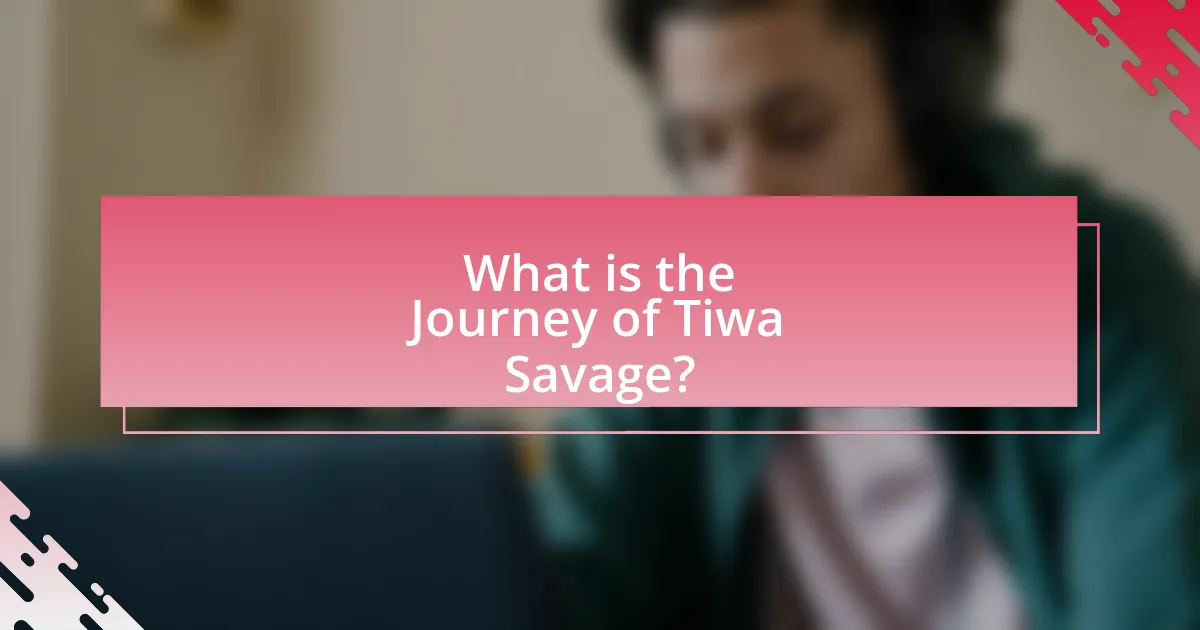
What is the Journey of Tiwa Savage?
Tiwa Savage’s journey began in Nigeria, where she was born on February 5, 1980, and later moved to the United States for her education. She gained initial recognition as a contestant on the UK version of X Factor in 2006, which showcased her vocal talent. After returning to Nigeria, Tiwa Savage became a prominent figure in the Afrobeats genre, releasing hit songs like “Kele Kele Love” and “Eminado.” Her collaborations with international artists and her role as a songwriter further solidified her status in the music industry. Tiwa Savage has received numerous awards, including the MTV Africa Music Award for Best Female, highlighting her influence and success as a global star.
How did Tiwa Savage start her career in music?
Tiwa Savage started her career in music by participating in the UK version of the television show “The X Factor” in 2006, where she gained initial exposure. Following her stint on the show, she moved to the United States to pursue her music career further, attending Berklee College of Music. This educational background, combined with her early experiences, laid the foundation for her successful career in the Nigerian music industry, where she became a prominent figure in Afrobeats.
What were Tiwa Savage’s early influences and inspirations?
Tiwa Savage’s early influences and inspirations included a blend of American and Nigerian artists, particularly the music of Whitney Houston and Fela Kuti. Whitney Houston’s powerful vocal style and Fela Kuti’s Afrobeat rhythms significantly shaped her musical identity. Additionally, Tiwa Savage’s exposure to various genres during her upbringing in Nigeria and her time in the United States further enriched her artistic development, allowing her to fuse traditional African sounds with contemporary pop and R&B elements.
How did her participation in X Factor shape her career?
Tiwa Savage’s participation in X Factor significantly shaped her career by providing her with a platform to showcase her talent to a wider audience. Competing in the show in 2006 allowed her to gain exposure and recognition, which led to opportunities in the music industry. Following her appearance, she signed a record deal with Sony ATV, marking a pivotal moment in her professional journey. This exposure not only enhanced her visibility but also facilitated collaborations with prominent artists and producers, ultimately contributing to her rise as a global music star.
What milestones define Tiwa Savage’s rise to fame?
Tiwa Savage’s rise to fame is defined by several key milestones, including her participation in the UK version of The X Factor in 2006, which showcased her vocal talent. Following this, she signed with Sony/ATV Music Publishing, becoming the first female Nigerian artist to do so, which significantly boosted her visibility in the music industry. In 2010, she released her debut single “Kele Kele Love,” which became a hit and established her as a prominent figure in the Nigerian music scene. Additionally, her collaborations with international artists, such as Wizkid and Drake, further solidified her global presence. In 2018, she made history by becoming the first female artist to win the Best African Act at the MTV Europe Music Awards, marking a significant recognition of her contributions to music. These milestones collectively illustrate her journey from a contestant on a talent show to an internationally recognized star.
What were the key moments in her career post-X Factor?
Tiwa Savage’s key moments post-X Factor include her signing with Sony Music in 2016, which significantly boosted her international presence. In 2018, she became the first female artist to win the Best African Act at the MTV Europe Music Awards, highlighting her influence in the music industry. Additionally, her collaboration with global artists like Beyoncé on “Brown Skin Girl” in 2019 further solidified her status as a global star. These milestones demonstrate her growth and impact in the music scene after her time on X Factor.
How did her debut album impact her popularity?
Tiwa Savage’s debut album, “Once Upon a Time,” significantly boosted her popularity by showcasing her unique blend of Afrobeat and R&B, which resonated with a wide audience. Released in 2013, the album featured hit singles like “Kele Kele Love” and “Eminado,” which topped charts and received extensive radio play, establishing her as a prominent figure in the Nigerian music scene. The album’s commercial success, evidenced by its nomination for Best Album of the Year at the 2014 Nigeria Entertainment Awards, further solidified her status and expanded her fan base both locally and internationally.
What challenges did Tiwa Savage face on her journey?
Tiwa Savage faced numerous challenges on her journey to becoming a global star, including cultural barriers, personal struggles, and industry obstacles. Initially, she encountered difficulties in gaining recognition in the competitive music industry, particularly as a female artist in a male-dominated space. Additionally, she dealt with the pressures of balancing her career with personal life, including the challenges of motherhood and navigating relationships. Financial constraints also posed a significant hurdle early in her career, impacting her ability to produce music and promote herself effectively. These challenges were compounded by the need to adapt to different cultural expectations as she transitioned from the UK music scene to the Nigerian entertainment industry.
How did she overcome obstacles in the music industry?
Tiwa Savage overcame obstacles in the music industry by leveraging her diverse musical influences and strong work ethic. She faced challenges such as gender bias and industry skepticism, particularly as a female artist in a male-dominated space. To combat these issues, she honed her craft through extensive training and performances, including her participation in the UK version of X Factor, which provided her with exposure and experience. Additionally, Savage built a strong brand by collaborating with prominent artists and producers, which helped her gain recognition and credibility. Her resilience and strategic networking ultimately led to her success as a global star, evidenced by her numerous awards and international collaborations.
What personal struggles did she navigate during her rise?
Tiwa Savage navigated significant personal struggles during her rise, including the challenges of being a single mother and dealing with the loss of her father. As a single mother, she faced the difficulties of balancing her career ambitions with parenting responsibilities, which often created emotional and logistical hurdles. Additionally, the death of her father in 2020 profoundly affected her, as she had to cope with grief while maintaining her professional commitments. These experiences shaped her resilience and determination in the competitive music industry.
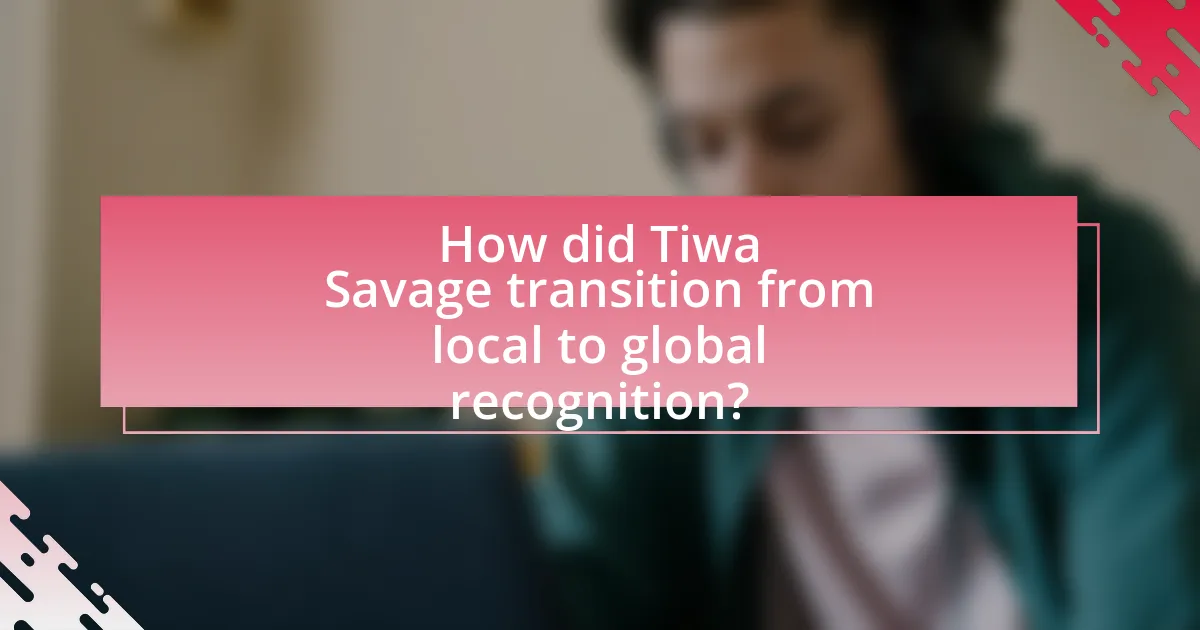
How did Tiwa Savage transition from local to global recognition?
Tiwa Savage transitioned from local to global recognition through strategic collaborations, international performances, and a unique blend of Afrobeat and pop music. Initially gaining fame in Nigeria, her participation in the UK’s “X Factor” showcased her talent to a broader audience. Collaborations with global artists like Wizkid and Drake, particularly on the remix of “One Dance,” significantly expanded her reach. Additionally, her performances at international music festivals and events, such as Coachella, further solidified her status as a global star. These efforts collectively contributed to her recognition beyond the African music scene.
What strategies did Tiwa Savage use to expand her audience?
Tiwa Savage expanded her audience through strategic collaborations, social media engagement, and international performances. Collaborating with global artists like Wizkid and Drake on tracks such as “Come Closer” helped her reach diverse fan bases. Additionally, her active presence on platforms like Instagram and Twitter allowed her to connect directly with fans, sharing personal insights and promoting her music. Furthermore, performing at international festivals and events, including the Global Citizen Festival, showcased her talent to a wider audience, enhancing her visibility and appeal beyond Africa.
How did collaborations with international artists influence her career?
Collaborations with international artists significantly elevated Tiwa Savage’s career by expanding her global reach and enhancing her musical versatility. These partnerships, including notable collaborations with artists like Wizkid, Drake, and Beyoncé, introduced her to diverse audiences and allowed her to blend various musical styles, such as Afrobeats with R&B and pop. For instance, her feature on Beyoncé’s “Brown Skin Girl” not only showcased her talent to a wider audience but also earned her a Grammy nomination, solidifying her status in the global music industry. Such collaborations have been pivotal in establishing her as a prominent figure in the international music scene, leading to increased recognition and opportunities.
What role did social media play in her global reach?
Social media significantly enhanced Tiwa Savage’s global reach by providing a platform for direct engagement with her audience. Through platforms like Instagram, Twitter, and Facebook, she shared her music, personal stories, and cultural experiences, which resonated with fans worldwide. This direct interaction allowed her to build a loyal fan base beyond Nigeria, evidenced by her millions of followers across various social media channels. Additionally, viral moments and collaborations promoted through social media amplified her visibility, leading to international performances and partnerships, thereby solidifying her status as a global star.
What are the key elements of Tiwa Savage’s musical style?
Tiwa Savage’s musical style is characterized by a blend of Afrobeats, R&B, and pop influences. This fusion allows her to create catchy melodies and rhythmic beats that resonate with a wide audience. Her vocal delivery often incorporates emotive storytelling, reflecting personal experiences and cultural themes, which enhances the relatability of her music. Additionally, Tiwa Savage frequently collaborates with various artists across genres, further enriching her sound and expanding her reach in the global music scene.
How does her blend of genres contribute to her uniqueness?
Tiwa Savage’s blend of genres, including Afrobeats, R&B, and pop, contributes to her uniqueness by allowing her to appeal to a diverse audience while showcasing her versatility as an artist. This fusion enables her to create a distinctive sound that resonates with both African and international listeners, setting her apart in the global music scene. For instance, her collaboration with international artists like Wizkid and Drake highlights her ability to bridge cultural gaps, further solidifying her position as a global star.
What themes are prevalent in her lyrics and music videos?
Tiwa Savage’s lyrics and music videos predominantly explore themes of love, empowerment, and resilience. Her songs often depict romantic relationships, showcasing both the joys and challenges of love, as seen in tracks like “All Over.” Additionally, she emphasizes female empowerment and independence, particularly in songs such as “49-99,” where she addresses social issues and encourages women to take charge of their lives. The visual storytelling in her music videos complements these themes, often featuring strong, confident women and vibrant cultural elements that reflect her Nigerian heritage. This combination of lyrical content and visual representation reinforces her messages of strength and authenticity.
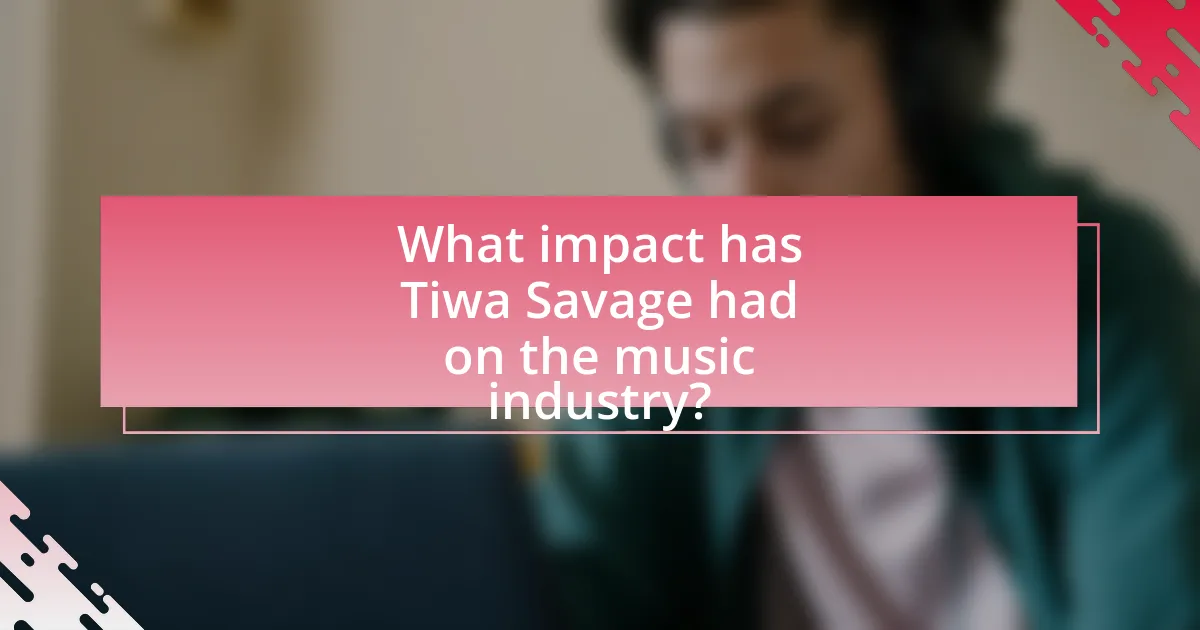
What impact has Tiwa Savage had on the music industry?
Tiwa Savage has significantly impacted the music industry by popularizing Afrobeats on a global scale. As one of the first female artists to achieve international recognition in this genre, she has opened doors for other African artists, showcasing the potential of African music worldwide. Her collaborations with global stars like Beyoncé and Wizkid have further elevated the visibility of Afrobeats, contributing to its mainstream acceptance. Additionally, Tiwa Savage’s success has inspired a new generation of female artists in Africa, promoting gender equality within the music industry. Her influence is evidenced by numerous awards, including the Best African Act at the 2018 MTV Europe Music Awards, which underscores her role in shaping the contemporary music landscape.
How has Tiwa Savage influenced other artists in Africa?
Tiwa Savage has significantly influenced other artists in Africa by pioneering the fusion of Afrobeats with various genres, thereby expanding the musical landscape. Her success has inspired a new generation of musicians to embrace their cultural roots while experimenting with diverse sounds. For instance, her collaborations with artists like Wizkid and Davido have set a precedent for cross-genre partnerships, encouraging others to explore similar collaborations. Additionally, Tiwa Savage’s visibility as a female artist in a predominantly male industry has empowered women in music, leading to an increase in female representation and success in the African music scene. Her achievements, including multiple awards and international recognition, serve as a benchmark for aspiring artists, demonstrating that global success is attainable.
What legacy is she building within the Afrobeats genre?
Tiwa Savage is building a legacy of innovation and global recognition within the Afrobeats genre. She has played a pivotal role in popularizing Afrobeats on international platforms, collaborating with global artists such as Beyoncé and Drake, which has significantly elevated the genre’s profile. Her contributions include blending traditional African sounds with contemporary pop and R&B elements, creating a unique sound that resonates with diverse audiences. Additionally, Tiwa Savage’s success has inspired a new generation of female artists in Africa, promoting gender equality and representation in the music industry. Her achievements, including multiple awards and chart-topping hits, underscore her influence and lasting impact on the Afrobeats genre.
How does her success challenge stereotypes in the music industry?
Tiwa Savage’s success challenges stereotypes in the music industry by breaking barriers for female artists, particularly in genres traditionally dominated by men. As a prominent Nigerian singer and songwriter, she has achieved international recognition, showcasing that women can excel in diverse musical styles, including Afrobeats, which has historically been male-centric. Her accomplishments, such as being the first female to win the MTV Africa Music Award for Best Female, demonstrate her ability to defy gender norms and inspire a new generation of female musicians. This success not only elevates her status but also encourages the industry to embrace more inclusive representations of women in music.
What lessons can aspiring artists learn from Tiwa Savage’s journey?
Aspiring artists can learn the importance of resilience and adaptability from Tiwa Savage’s journey. Tiwa Savage faced numerous challenges, including early setbacks in her career and the competitive nature of the music industry. Her participation in the UK’s X Factor showcased her determination to pursue her passion despite obstacles. Additionally, her ability to blend various musical styles, such as Afrobeats and R&B, demonstrates the value of versatility in appealing to a broader audience. Tiwa’s success, marked by multiple awards and international collaborations, underscores the significance of hard work and continuous evolution in an artist’s career.
What best practices can be derived from her career path?
Best practices derived from Tiwa Savage’s career path include embracing authenticity, leveraging diverse experiences, and maintaining resilience in the face of challenges. Tiwa Savage’s authenticity in her music and public persona has resonated with audiences, demonstrating the importance of staying true to oneself. Additionally, her diverse experiences, from participating in X Factor to collaborating with international artists, highlight the value of versatility and adaptability in a competitive industry. Finally, her resilience, particularly in overcoming setbacks and navigating the complexities of the music business, underscores the necessity of perseverance for long-term success.
How can artists effectively navigate challenges in the industry?
Artists can effectively navigate challenges in the industry by leveraging networking, continuous skill development, and adapting to market trends. Networking allows artists to build relationships with industry professionals, which can lead to collaboration opportunities and increased visibility. Continuous skill development, such as improving musical abilities or learning about digital marketing, ensures that artists remain competitive in a rapidly changing landscape. Adapting to market trends, including understanding audience preferences and utilizing social media platforms, enables artists to reach wider audiences and maintain relevance. For instance, Tiwa Savage’s success can be attributed to her ability to connect with diverse audiences and her strategic use of social media to promote her music, demonstrating the effectiveness of these strategies in overcoming industry challenges.







